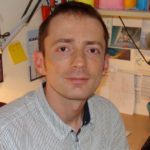Link to Pubmed [PMID] – 26804904
Cell Rep 2016 Feb;14(5):1114-1127
Mammalian cells deficient in ATR or Chk1 display moderate replication fork slowing and increased initiation density, but the underlying mechanisms have remained unclear. We show that exogenous deoxyribonucleosides suppress both replication phenotypes in Chk1-deficient, but not ATR-deficient, cells. Thus, in the absence of exogenous stress, depletion of either protein impacts the replication dynamics through different mechanisms. In addition, Chk1 deficiency, but not ATR deficiency, triggers nuclease-dependent DNA damage. Avoiding damage formation through invalidation of Mus81-Eme2 and Mre11, or preventing damage signaling by turning off the ATM pathway, suppresses the replication phenotypes of Chk1-deficient cells. Damage and resulting DDR activation are therefore the cause, not the consequence, of replication dynamics modulation in these cells. Together, we identify moderate reduction of precursors available for replication as an additional outcome of DDR activation. We propose that resulting fork slowing, and subsequent firing of backup origins, helps replication to proceed along damaged templates.


